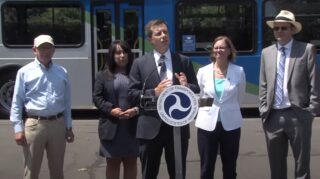
These are wild times for climate change in America. We have floods and droughts and fires and heat waves — scary, deadly, catastrophic events — unfolding in front of our eyes as policymakers scramble to satisfy an anxious public and activists increase the volume of their pleas.
Yesterday in Eugene, the Biden Administration’s top transportation leader, US Department of Transportation Secretary Pete Buttigieg appeared at a press conference with U.S. Congressmen and Chair of the House Transportation & Infrastructure Committee, Peter DeFazio. They and other officials spent the day viewing safety challenges on Highway 99 in Corvallis and driving an all-electric bus. The high-profile visit was part of a tour to tout Biden’s Bipartisan Infrastructure Framework.
As the climate issue heats up, so too are calls to use transportation policy as a way to address it.
DeFazio spoke in stark terms about the climate crisis during his remarks. “This is the 21st century, the Eisenhower [Interstate Highway] Plan was built for the existential threat of the time; invasion by Russia so we could move troops and equipment quickly to the coasts. Or nuclear war, so we could evacuate our cities. We have a new existential threat,” DeFazio said. “And that’s climate change… We have to deal seriously with this.”
Advertisement
“In too many places around the country in the automobile era, we designed everything for throughput of automobiles, and no thought to pedestrians, no thought to to cycling or alternative modes.”
— Peter DeFazio, U.S. House Representative
DeFazio then hyped-up the spending outline of the $579 billion proposal. Most of his excitement seemed to be around electrification of transportation because he sees how production of batteries and other related hardware (500,000 electric vehicle charging stations) could boost the jobs appeal of the package (and earn Republican support).
And in a sign of how far the concept of transportation justice and equity have come in the past few years, DeFazio said, “In too many places around the country in the automobile era, we designed everything for throughput of automobiles, and no thought to pedestrians, no thought to to cycling or alternative modes. Just move the traffic as quickly as possible.” “We divided communities of color. And that was done in many places intentionally,” he continued. “We can still have traffic, but we can have it safe for cycling and pedestrians and others. And we can also restore social equity.”
It’s very notable to have DeFazio — chair of the House T & I Committee and one of the most respected voices on transportation on Capitol Hill — speak so clearly about the ills of our car-centric highway legacy.
Buttigieg also made climate change central to his pitch. “Oregon unfortunately, like so many other places in the world has reminded us of what’s at stake in the climate crisis,” he said. “Things that we had talked about maybe going to happen in the middle of this century, that instead happened last week. Things that are only going to accelerate and become more and more damaging if we let them… The climate crisis isn’t just coming. It’s it’s upon us.”
Like DeFazio, Buttigieg made some space for cycling in his comments. He said “bicycle commuting and bicycle recreation,” are “especially important” for the future of our cities. The framework includes $10 billion for “safety,” and Buttigieg said nearly half of that would go toward projects that will allow people to walk or use a wheelchair or use a bike safely, “and don’t have to bring two tons of metal with them everywhere they’re going.” Another way the plan will make it easier to live a low-car lifestyle is the $50 billion set-aside for public transit, which would be the largest such investment in American history.
Words matter when it comes to organizing and persuasion, but a warming planet can’t hear them. These politicians must deliver bold funding and policy measures if we want to stem the tide of this crisis. While there’s been promising momentum of late, there’s still a lot of negotiations and politics to come. Senate Majority Leader Chuck Schumer has set a July 21st deadline to stop talking and start moving forward with the legislation.
— Jonathan Maus: (503) 706-8804, @jonathan_maus on Twitter and jonathan@bikeportland.org
— Get our headlines delivered to your inbox.
— Support this independent community media outlet with a one-time contribution or monthly subscription.

